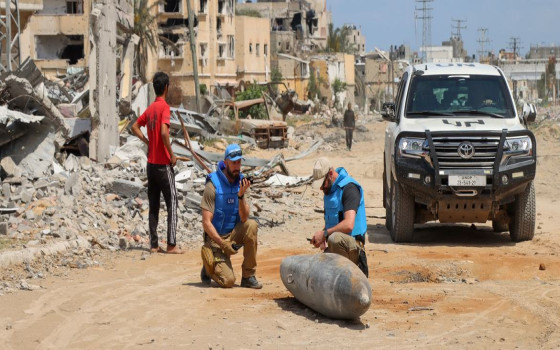
One hundred million people around the world face the threat of landmines and explosive remnants of war, and the majority of victims are children, including in Sudan, Libya, Syria, the Palestinian territories, Ukraine, Afghanistan, and Myanmar.

- Europe and Arabs
- Friday , 4 April 2025 11:6 AM GMT
New York: Europe and the Arabs
On the International Day for Mine Awareness, the UN Secretary-General warned that more than 100 million people around the world face the threat of landmines, explosive remnants of war, and improvised explosive devices. According to the UN Daily News Bulletin, a copy of which we received Friday morning, Guterres emphasized in a message on the occasion the role the United Nations plays in eliminating these weapons and protecting civilians.
From Afghanistan to Myanmar, from Sudan to Ukraine, Syria, the occupied Palestinian territory, and elsewhere, these deadly devices are spreading across rural and urban communities, indiscriminately killing civilians and blocking vital humanitarian and development efforts, according to the Secretary-General.
Even when the guns fall silent, these remnants of war remain, lurking in fields, along paths, and roads, threatening the lives of innocent civilians and the livelihoods of local communities. UNMAS at the forefront of mine action efforts
At a press conference in New York on Thursday, officials from the United Nations Mine Action Service (UNMAS) confirmed that landmines, improvised explosive devices (IEDs), and explosive remnants of war (ERW) continue to cause death and injury on a daily basis, more than a quarter century after the signing of the Anti-Personnel Mine Ban Treaty, known as the Ottawa Treaty.
"The casualty rate is averaging one person every hour, and many of the victims are children," said Richard Boulter, head of UNMAS's Design, Operational Support, and Oversight Section. He noted that the use of improvised explosive devices (IEDs) has expanded, threatening civilians and humanitarian workers.
He noted that in 2024, UNMAS coordinated relevant activities for 12 UN departments, agencies, programs, and funds, surveying and clearing hazardous areas, clearing roads to facilitate safe movement and trade, destroying tens of thousands of mines and ERW, and supporting UN missions and host countries in arms and ammunition management. He concluded by saying, "We have acted as a last resort in places like Gaza when the UN continued to serve and implement its humanitarian mandate."
Libya
Fatima Zureiq, Head of the Mine Action Programme in Libya, said that Libya continues to suffer from the remnants of war. She added that between May 2020 and early 2025, more than 200 incidents were recorded, resulting in more than 300 casualties, including 125 deaths, many of them civilians and children.
Zreiq, speaking via video link from Tripoli, noted that "these numbers may seem low compared to other severely affected contexts like Syria, but they remain extremely worrying in Libya, where every incident carries a significant humanitarian and psychological weight."
She explained that "threats range from anti-personnel and anti-vehicle mines to unexploded ordnance, improvised explosive devices, and unsecured ammunition stores."
Zreik emphasized that "clearing Libya (of remnants of war) is not just a technical task, but a humanitarian and peacebuilding effort. It is about saving lives, restoring confidence, and enabling people to return home."
Nigeria
Edwin Wegman, Head of the Mine Action Programme in Nigeria, said the war against Boko Haram and other non-state armed groups has entered its sixteenth year, noting that the fighting has led to contamination by explosive remnants of war, including mines, improvised explosive devices, and unexploded ordnance.
Wegman, speaking via video link, noted that UNMAS recorded the highest number of civilian casualties from explosive remnants of war in 2024 since 2019, with 418 civilian casualties in northeastern Nigeria alone. He added that these figures represent a 62% increase compared to 2023.
A secure future starts here
The United Nations marks the International Day for Mine Awareness and Assistance in Mine Action annually on April 4. The theme for this year's observance is "A secure future starts here."
The Secretary-General urged all States that have not yet done so to ratify and fully implement the Anti-Personnel Mine Ban Convention, the Convention on Cluster Munitions, and the Convention on Certain Conventional Weapons.
He also urged States to uphold the global commitments contained in the Charter for the Future, adopted in September, to restrict or prohibit the use of explosive weapons in populated areas and to support all efforts aimed at ending the threat of explosive ordnance.












No Comments Found